As homeowners, we’ve all experienced the frustration of unwanted pests infiltrating our living spaces. But what if you could tap the natural power of plants to keep these unwanted visitors at bay? Research has shown that certain plant species possess innate properties that repel insects, offering a chemical-free solution to traditional pest control methods. From fragrant herbs to flowering ornamentals, these incredible plants can be easily integrated into your home and garden, providing a safe and effective barrier against bugs. But which plants make the cut, and how can you maximize their bug-repelling potential?
Fragrant Repellent Plants
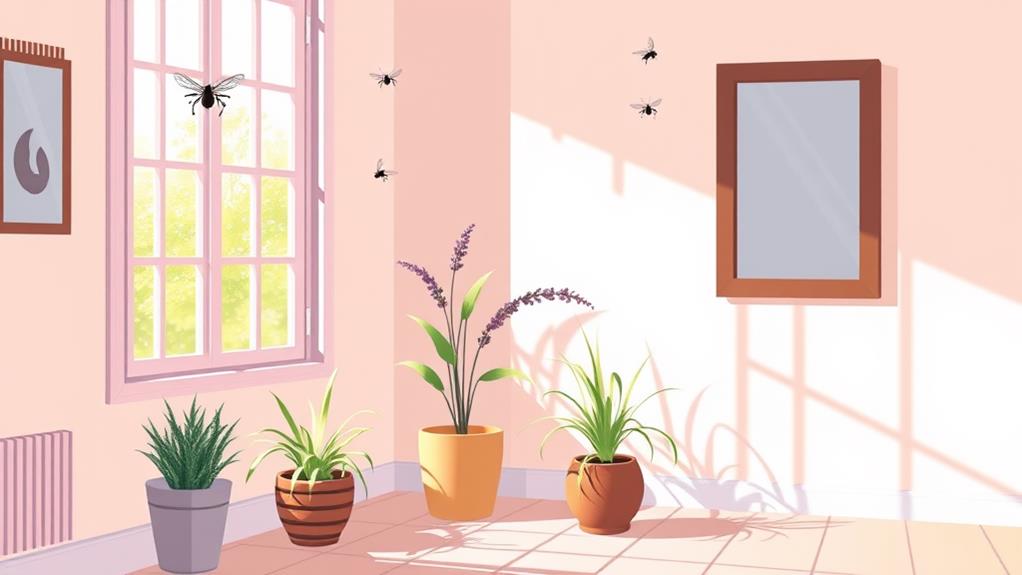
Fragrant repellent plants offer a natural and effective way to keep bugs out of your home.
These plants possess potent essential oils that repel insects, providing a non-toxic and environmentally friendly alternative to chemical-based pesticides.
Lavender, for instance, repels moths, fleas, and mosquitoes with its calming scent.
Basil’s strong aroma keeps bugs at bay, while mint’s pungent flavor is detested by most insects.
Lemongrass, garlic, and rosemary are likewise known for their natural insect-repelling properties.
Citronella, a popular essential oil, is commonly used in candles, sprays, and other products to keep bugs away.
Garden-Friendly Bug Repellents
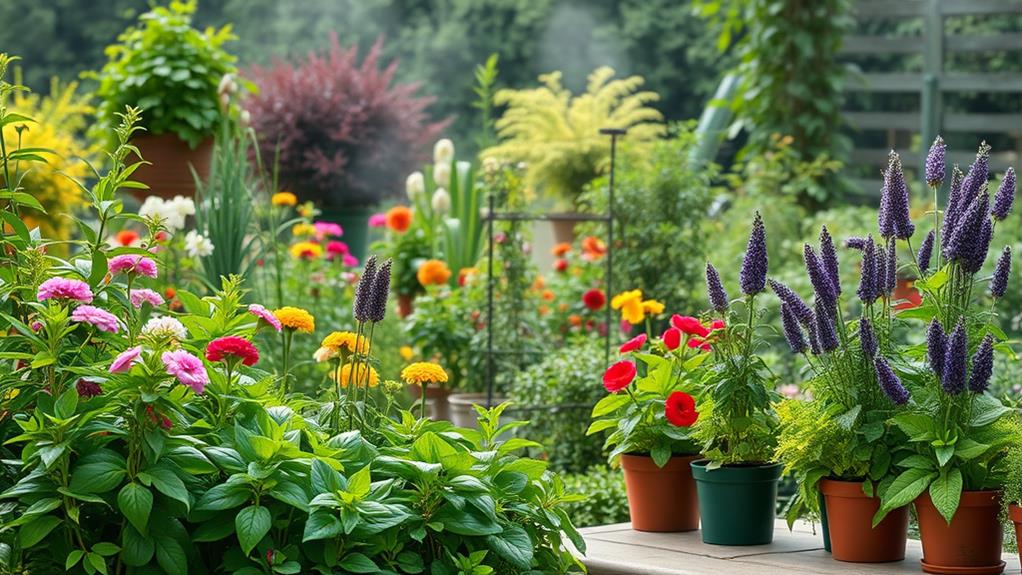
Beyond fragrant repellents, certain plants excel as garden-friendly bug repellents, offering an additional layer of defense against unwanted pests in outdoor spaces.
These plants not only add aesthetic value to gardens but in addition provide a natural barrier against insects.
- Basil: A great addition to gardens, its strong scent keeps bugs at bay.
- Mint: Can be grown in pots indoors or planted in gardens, but it should be contained to prevent it from taking over.
- Lemongrass: A tropical plant that does best in zones 9-11, but it can be grown in pots and brought inside in the winter.
- Chrysanthemums: Beautiful flowers that contain pyrethrin, a natural insect repellent commonly used in bug sprays.
Unconventional Pest Control

Occasionally, homeowners may find themselves seeking alternative methods to deter pests from their living spaces.
This is where unconventional pest control methods come into play. One such method is the use of bay leaves, which can be placed in areas like windowsills and near cracks or crevices to keep pests out of pantries and homes.
Another example is the Venus flytrap, a carnivorous plant that lures insects into traps, keeping bugs out of homes. Spider plants are likewise effective, as they help purify the air and keep pests away.
Furthermore, eucalyptus oil can be rubbed on skin to keep bugs from biting and mixed with water to create a bug-repelling spray. These unconventional methods offer innovative solutions for homeowners seeking alternative pest control approaches.
Effective Gardening and Pest Tips
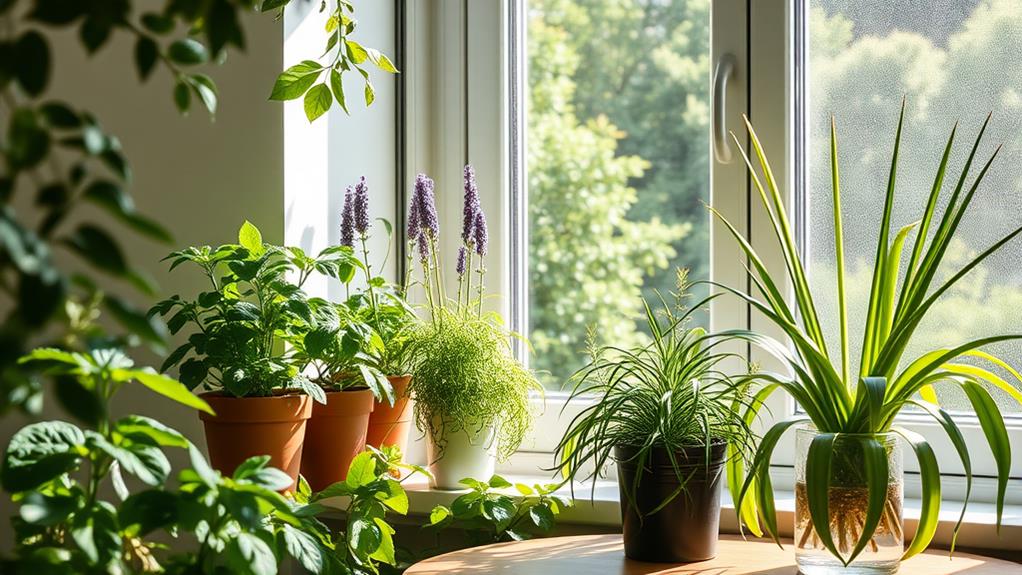
Implementing effective gardening and pest tips can significantly enhance the overall health and appearance of your outdoor space while minimizing the presence of unwanted pests.
By incorporating these tips, homeowners can create a harmonious balance between nature and their living space.
- Proper plant selection: Choose plants that are native to your region and require minimal maintenance, ensuring they thrive in local conditions.
- Regular pruning: Prune plants regularly to promote healthy growth, prevent overcrowding, and reduce hiding spots for pests.
- Soil maintenance: Maintain well-draining soil with a balanced pH level to cultivate a healthy ecosystem.
- Companion planting: Plant complementary species in proximity to deter pests, such as basil with tomatoes or marigolds with carrots.
Natural Bug Repellent Benefits
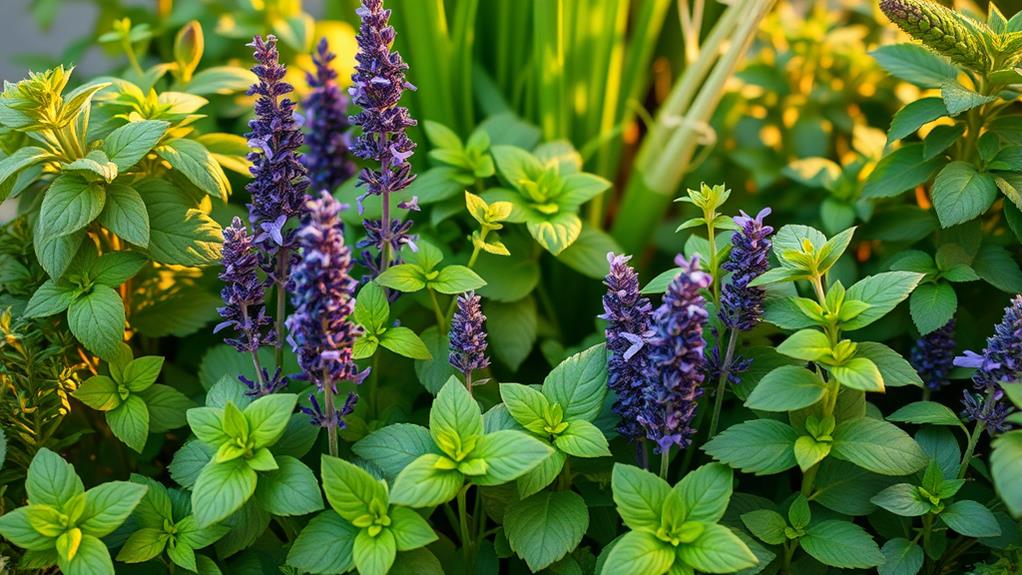
The incorporation of natural bug repellent plants into your home and garden offers a multidimensional approach to pest control, providing numerous benefits that extend beyond mere repellency.
| Benefit | Description | Examples |
|---|---|---|
| Aesthetic Appeal | Natural bug repellent plants can add beauty and elegance to your home and garden | Lavender, Chrysanthemums, Petunias |
| Chemical-Free | These plants provide a safer alternative to chemical-based bug repellents | Basil, Mint, Lemongrass |
| Multifunctional | Many natural bug repellent plants have multiple uses, such as cooking and air purification | Rosemary, Garlic, Spider plants |
These plants not only repel bugs but in addition offer additional benefits, making them a valuable addition to any home or garden. By incorporating natural bug repellent plants, you can create a comprehensive pest control strategy that is both effective and eco-friendly.
DIY Bug Repellent Solutions
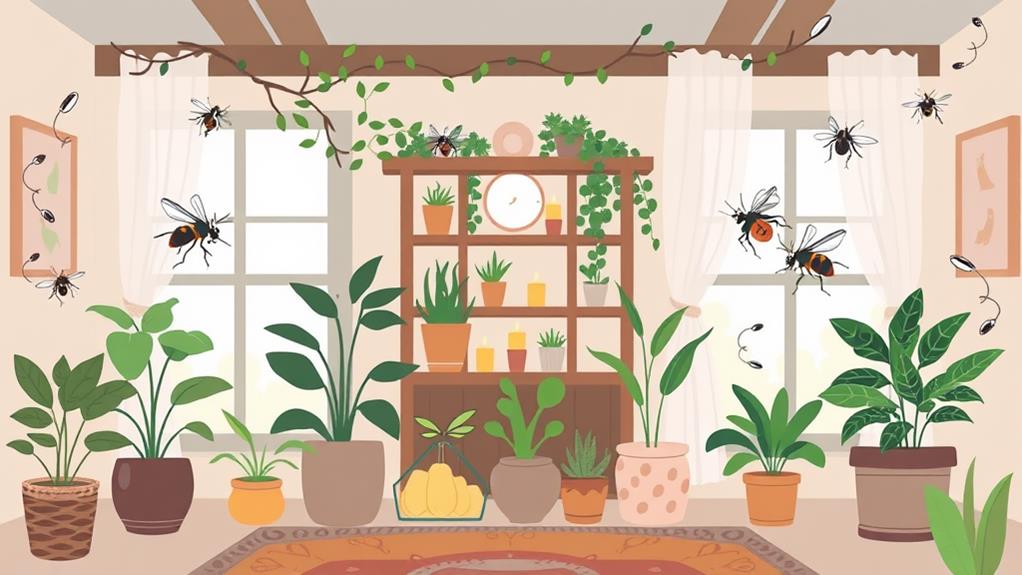
With the benefits of natural bug repellent plants well established, it’s time to explore into the creative and cost-effective possibilities of DIY bug repellent solutions.
- Create a bug-repelling spray by mixing essential oils from fragrant herbs like lavender, basil, and mint with water.
- Use lemongrass oil to make a natural mosquito repellent spray that can be applied to skin or clothing.
- Incorporate garlic into your cooking to repel bugs, and use its essential oils to create a natural pesticide.
- Combine citronella oil with other natural oils to create a potent bug repellent candle or spray.
Plants for a Pest-Free Home
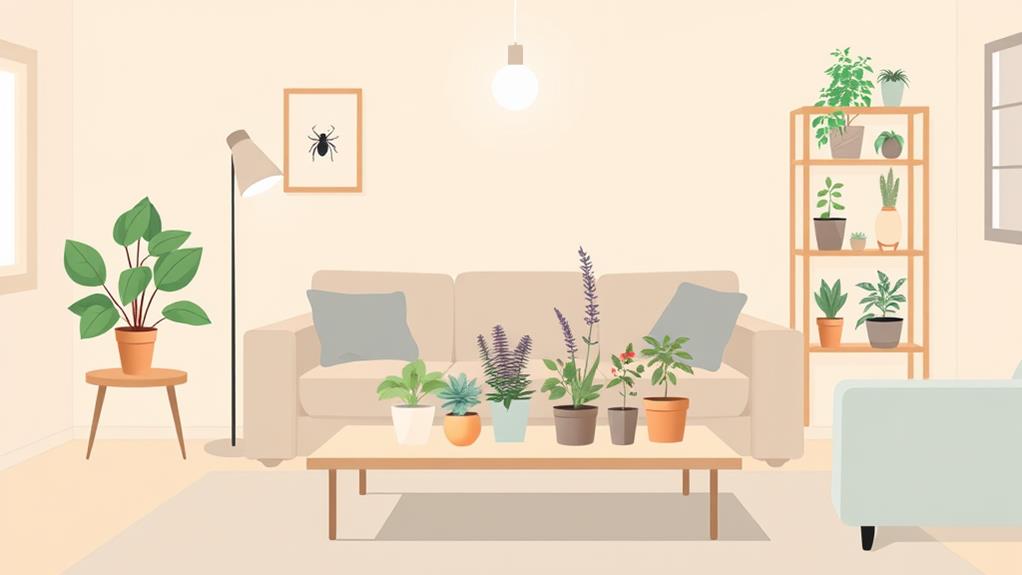
By incorporating plants that naturally repel bugs into your home decor, you can create a pest-free environment without relying on chemical-based solutions.
Fragrant repellents like lavender, basil, mint, lemongrass, garlic, and rosemary can be used to keep bugs at bay.
Garden-friendly repellents such as basil, mint, lemongrass, chrysanthemums, and petunias can be planted in gardens or indoors to repel pests.
Unconventional repellents like bay leaves, Venus flytraps, and spider plants can in addition be used to keep bugs away.
Conclusion
In summary, incorporating specific plant species into one’s home or garden can effectively deter bug infestations. Fragrant repellent plants, garden-friendly bug repellents, and unconventional pest control methods offer viable alternatives to chemical-based solutions. By implementing effective gardening and pest tips, individuals can leverage the natural bug repellent benefits of these plants. DIY bug repellent solutions and strategic plant placement can create a pest-free home environment, providing a safer and healthier living space.

